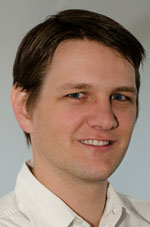 |
Brian Campbell
14 September 2012 |
A UFS student in Computer Science and Informatics, Brian Campbell of the Department of Computer Science and Informatics, has joined an elite group of South Africans, was invited to join the Microsoft Student Partner (MSP) programme in April 2012. Approximately 500 computer science and information technology students are chosen worldwide each year to form part of this elite student development programme. This year, 16 South African students were invited to join the MSP program.
These students will be Microsoft’s first non-industry partners to be trained in its newest and most revolutionary technologies that will be launched within the coming months. As part of their commitment to Microsoft, most of the students will train the lecturers and students of their respective universities, as well as Microsoft’s national industry partners and lecturers of universities and universities of technology that do not have MSPs on their campuses.
In May this year, Brian assisted employees from Microsoft to present a Windows 8 seminar at its offices in Cape Town.
Additional Microsoft related events have been arranged by Brian. These include a Windows Phone development day and an upcoming Windows 8 development seminar. Five students in the Department of Computer Science and Informatics were rewarded with Nokia Lumia cell phones after they published at least five applications on the Windows Phone Marketplace.